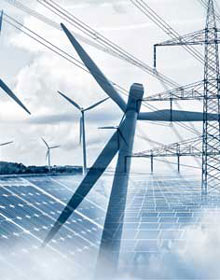
In a significant stride towards sustainable energy and climate change mitigation, Cape Town has successfully completed a 990kWp renewable energy project at the Kraaifontein Wastewater Treatment Plant. The project was officially unveiled by Alderman Xanthea Limberg, the City’s Mayoral Committee Member for Energy, and Councillor Zahid Badroodien, Mayoral Committee Member for Water and Sanitation.
This innovative project is a key component of Cape Town's broader solar photovoltaic (PV) initiative, which aims to enhance energy security across residential, commercial, and municipal sectors. The newly installed solar system at Kraaifontein is part of the City’s small-scale embedded generation (SSEG) programme, which has already seen successful installations at the Goodwood Transport Management Centre (330kWp) and the Gugulethu Electricity Depot (125kWp).
Together, these projects represent a significant investment of R20.6 million and are expected to yield substantial savings. In the first year alone, the City anticipates saving R2.4 million in electricity costs while contributing 1.5 GWh of clean energy annually. This initiative highlights Cape Town’s commitment to reducing greenhouse gas emissions and diversifying its energy mix.
Alderman Xanthea Limberg emphasized the project's importance in the context of global climate commitments. “This initiative not only supports South Africa’s commitment to international climate obligations but also strengthens our local energy infrastructure,” she said during the unveiling ceremony. Limberg further explained that the project is a vital step in reducing the City’s carbon footprint and promoting sustainable development.
Councillor Zahid Badroodien echoed these sentiments, noting the dual benefits of the project. "By integrating renewable energy solutions into our wastewater treatment processes, we are not only advancing our sustainability goals but also ensuring the efficient and cost-effective operation of essential municipal services,” he stated.
The completion of the Kraaifontein project is particularly timely as Cape Town faces ongoing challenges related to energy security. Load-shedding and electricity supply disruptions have plagued many South African cities, underscoring the need for reliable and sustainable energy sources. The City’s SSEG programme is a proactive response to these challenges, aiming to stabilize and enhance the local energy grid.

Looking ahead, Cape Town has ambitious plans to further bolster its energy infrastructure. Over the next three years,the City plans to invest more than R4 billion in electricity grid upgrades and maintenance. These investments are expected to significantly improve the reliability of the energy supply and mitigate the impacts of load-shedding.
One of the most noteworthy aspects of Cape Town’s energy strategy is its goal to add up to one gigawatt of independent power supply by 2026. This bold target reflects the City’s commitment to pioneering innovative energy solutions and ensuring a sustainable and resilient energy future for its residents.
As part of its ongoing efforts to promote renewable energy, Cape Town continues to explore various technologies and partnerships. The success of the Kraaifontein project and other SSEG initiatives serves as a model for other municipalities in South Africa and beyond, demonstrating the potential of renewable energy to drive economic and environmental benefits.
In conclusion, the completion of the 990kWp renewable energy project at the Kraaifontein Wastewater Treatment Plant marks a significant milestone in Cape Town’s sustainability journey. By investing in renewable energy and future-proofing its energy infrastructure, the City is setting a precedent for others to follow. As Cape Town looks to the future, its commitment to sustainable energy and climate change mitigation remains unwavering, promising a cleaner, greener, and more resilient energy landscape.
(Credit: SolarQuarter)


Leave a Comment